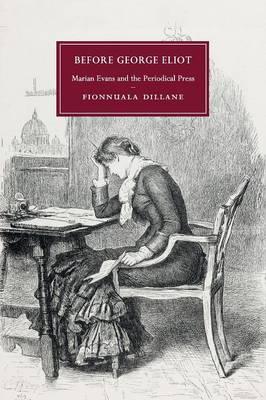Overview
Fionnuala Dillane revisits the first decade of Marian Evans's working life to explore the influence of the periodical press on her emergence as George Eliot and on her subsequent responses to fame. This interdisciplinary study discusses the significance of Evans's work as a journalist, editor and serial-fiction writer in the periodical press from the late 1840s to the late 1850s and positions this early career against critical responses to Evans's later literary persona, George Eliot. Dillane argues that Evans's association with the nineteenth-century periodical industry, that dominant cultural force of the age, is important for its illumination of Evans's understanding of the formation of reading audiences, the development of literary genres and the cultivation of literary celebrity.
Full Product Details
Author: Fionnuala Dillane (University College Dublin)
Publisher: Cambridge University Press
Imprint: Cambridge University Press
Volume: 88
Dimensions:
Width: 15.20cm
, Height: 1.50cm
, Length: 22.90cm
Weight: 0.400kg
ISBN: 9781316600979
ISBN 10: 1316600971
Pages: 290
Publication Date: 21 January 2016
Audience:
Professional and scholarly
,
Professional & Vocational
Format: Paperback
Publisher's Status: Active
Availability: Manufactured on demand

We will order this item for you from a manufactured on demand supplier.
Reviews
... elucidate[s] the complexity of the networks that underpinned the periodical press and [is] an essential research resource for anyone embarking on their own study of the Victorian literary marketplace. Clare Horrocks, Journal of Victorian Culture This remarkable and refreshing book challenges the conventional treatment of the early literary labors of Marian Evans in the 1850s as merely apprentice-work for George Eliot as a novelist of high Victorian literature. Susan David Bernstein, Nineteenth-Century Gender Studies In her extended portrait of Marian Evans as an astute and flexible professional in the periodical marketplace, Fionnuala Dillane offers a welcome corrective to the image of George Eliot as a reclusive sibyl ... Dillane's grounding of Evans's many narrative personae in specific practices of her periodical culture also serves to dislodge the stubborn image of Eliot as the goddess of sympathy. Dillane is refreshingly skeptical about that image, creating in its stead a writer alert to what her public required and strategic about accommodating her variable styles to those needs. Rosemarie Bodenheimer, Victorian Studies
"""… elucidate[s] the complexity of the networks that underpinned the periodical press and [is] an essential research resource for anyone embarking on their own study of the Victorian literary marketplace."" Clare Horrocks, Journal of Victorian Culture ""This remarkable and refreshing book challenges the conventional treatment of the early literary labors of Marian Evans in the 1850s as merely apprentice-work for George Eliot as a novelist of high Victorian literature."" Susan David Bernstein, Nineteenth-Century Gender Studies ""In her extended portrait of Marian Evans as an astute and flexible professional in the periodical marketplace, Fionnuala Dillane offers a welcome corrective to the image of George Eliot as a reclusive sibyl … Dillane’s grounding of Evans’s many narrative personae in specific practices of her periodical culture also serves to dislodge the stubborn image of Eliot as the goddess of sympathy. Dillane is refreshingly skeptical about that image, creating in its stead a writer alert to what her public required and strategic about accommodating her variable styles to those needs."" Rosemarie Bodenheimer, Victorian Studies"
... elucidate[s] the complexity of the networks that underpinned the periodical press and [is] an essential research resource for anyone embarking on their own study of the Victorian literary marketplace. Clare Horrocks, Journal of Victorian Culture This remarkable and refreshing book challenges the conventional treatment of the early literary labors of Marian Evans in the 1850s as merely apprentice-work for George Eliot as a novelist of high Victorian literature. Susan David Bernstein, Nineteenth-Century Gender Studies In her extended portrait of Marian Evans as an astute and flexible professional in the periodical marketplace, Fionnuala Dillane offers a welcome corrective to the image of George Eliot as a reclusive sibyl ... Dillane's grounding of Evans's many narrative personae in specific practices of her periodical culture also serves to dislodge the stubborn image of Eliot as the goddess of sympathy. Dillane is refreshingly skeptical about that image, creating in its stead a writer alert to what her public required and strategic about accommodating her variable styles to those needs. Rosemarie Bodenheimer, Victorian Studies
... elucidate[s] the complexity of the networks that underpinned the periodical press and [is] an essential research resource for anyone embarking on their own study of the Victorian literary marketplace. Clare Horrocks, Journal of Victorian Culture This remarkable and refreshing book challenges the conventional treatment of the early literary labors of Marian Evans in the 1850s as merely apprentice-work for George Eliot as a novelist of high Victorian literature. Susan David Bernstein, Nineteenth-Century Gender Studies In her extended portrait of Marian Evans as an astute and flexible professional in the periodical marketplace, Fionnuala Dillane offers a welcome corrective to the image of George Eliot as a reclusive sibyl ... Dillane's grounding of Evans's many narrative personae in specific practices of her periodical culture also serves to dislodge the stubborn image of Eliot as the goddess of sympathy. Dillane is refreshingly skeptical about that image, creating in its stead a writer alert to what her public required and strategic about accommodating her variable styles to those needs. Rosemarie Bodenheimer, Victorian Studies
Author Information
Fionnuala Dillane researches and teaches at the School of English, Drama and Film Studies, University College Dublin.




